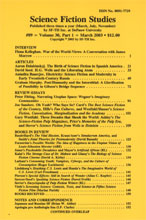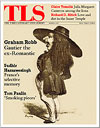Britain's Times Literary Supplement Reviews DePauw's Science Fiction Studies
March 20, 2003
 March 20, 2003, Greencastle, Ind. - The March 7 edition of the Times Literary Supplement, which has been called the world's most authoritative review of literature, scholarship and the visual and performing arts, examines the journal Science Fiction Studies, which is edited and published by two DePauw University faculty members: Arthur B. Evans, professor of modern languages and Istvan Csicsery-Ronay Jr., professor of English. Paul Kincaid reviews three science fiction journals: DePauw's publication; Foundation, which is published by the University of Liverpool in Britain; and Extrapolation, produced by the University of Texas at Brownsville and Texas Southmost College.
March 20, 2003, Greencastle, Ind. - The March 7 edition of the Times Literary Supplement, which has been called the world's most authoritative review of literature, scholarship and the visual and performing arts, examines the journal Science Fiction Studies, which is edited and published by two DePauw University faculty members: Arthur B. Evans, professor of modern languages and Istvan Csicsery-Ronay Jr., professor of English. Paul Kincaid reviews three science fiction journals: DePauw's publication; Foundation, which is published by the University of Liverpool in Britain; and Extrapolation, produced by the University of Texas at Brownsville and Texas Southmost College.
Kincaid opines, "Science Fiction Studies (published at DePauw University, Indiana) has always been resolutely academic, the articles always peer-reviewed (a practice that Foundation is only now beginning), and with an uncompromising approach to the complexities of critical theory. It has also tended to look mostly at the canonical figures of science fiction, and at the genre's past (an article in the March 2002 issue on Gustave Le Rouge, a French writer roughly contemporary with H.G. Wells, is typical of this approach, though this and the fact the entire November 2002 issue is devoted to Japanese  science fiction are also indicative that the journal casts its nets far wider than its fellows)."
science fiction are also indicative that the journal casts its nets far wider than its fellows)."
TLS says Foundation "has been the most populist" of the three journals and suggests that Science Fiction Studies is the most scholarly. "Traditionally, Extrapolation has held the middle ground between these two. Unlike Science Fiction Studies, it tends not to spend too long on pure theory, and adopts a rather more historical tone than Foundation."
In summary, the reviewer notes that "the extent to which current literary theory -- postmodernism, queer theory, feminist theory -- builds on science fiction has, if anything, emboldened science fiction scholars. There is, for instance, considerably less emphasis on establishing a science fiction canon, and the usual canonical authors -- Wells, Brian Aldiss, Philip K. Dick, Ursula K. Le Guin, William Gibson, J.G. Ballard -- are notably absent. The result is a refreshing sense that science fiction is a wider, more varied and more valuable genre than it has sometimes seemed, and a more scholarly one."
 Science Fiction Studies can be accessed online here. The TLS is available online, by subscription. You can access the publication's Web site by clicking here.
Science Fiction Studies can be accessed online here. The TLS is available online, by subscription. You can access the publication's Web site by clicking here.
Learn more about Dr. Evans, who has been called America's "Most Prominent Jules Verne Scholar" by Forbes magazine in this previous story and at the professor's Web page.
Back